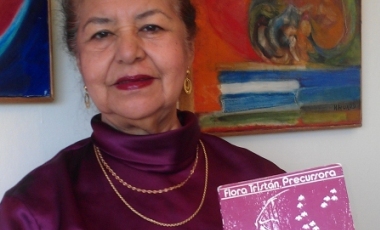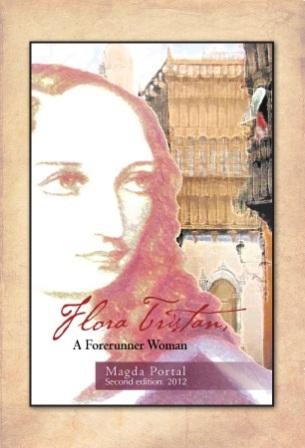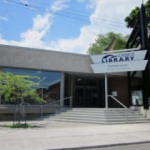Book wrote By Magda Portal
 REDACCION / TORONTO /
REDACCION / TORONTO /
En 1983, cuando Magda Portal había terminado su investigación sobre Flora Tristán, llamó su libro: “Flora Tristán, Precursora”. Muchas editoriales quisieron publicarlo pero ella sabía el interés de Renee Castro en llegar a más mujeres: amas de casa, estudiantes, profesionales, etc., con un libro ágil, fácil de leer.
Renee llamó a algunas amigas, 6 mujeres en total, incluida Magda, para formar la Editorial La Equidad. Con este aporte pagó la imprenta y ellas mismas hicieron la distribución y difusión del libro. A pesar de los años difíciles después de 1980, Renee consiguió publicar 14 libros más, de mujeres para mujeres, hasta el año 2000.
Cuando llegó a Canadá en el 2001, y la invitaban a conversar sobre su país, sus experiencias, la situación de la mujer, etc., Renee hablaba de Flora Tristán y nadie la conocía a pesar de su importancia internacional. Fue a los ámbitos universitarios y era lo mismo; no la conocían.
Desde allí creció su interés por traducir el libro de Magda Portal, por lo que comenzó a buscar traductores oficiales pero resultaban carísimos porque cobran por palabra. De $10,000 a $5,000 era el costo estimado.
Un día, la directora del New Canadian Centre de Peterborough le presentó a la traductora Rita Granda, quien leyó el libro, se identificó con la autora, el personaje, su mensaje, y decidió hacer el proyecto con Renee.
Estas dos mujeres trabajaron juntas en la traducción durante más de 2 años, pero no fue sino hasta hace poco más de un año, aquí en Toronto, que Renee logró terminar la traducción con un amigo y ahora finalmente ya la obra está en vísperas de salir a luz para las y los lectores de habla Inglesa.
Esto es lo que Renee Castro dijo recientemente sobre la publicación de esta obra en el idioma inglés:
P. What inspired you to write this book?
This book was written by Magda Portal. In 1983, I was the editor of the first edition, and then it was published by Editorial La Equidad (Lima – Peru). Later in 2009, I realized the Flora Tristan, the French-Peruvian writer was almost unknown in the English and Commonwealth Countries. Then I realized how important is to spread Flora’s ideas and to give a second edition to this book.
P. Summarize your book in one to three sentences.
Flora Tristan was a workers’ activist and earlier feminist of the 19th Century. Also Flora Tristan theories aimed to transform capitalist society and create a better world. For example, Flora pledged to convince the proletariat that without women’s liberation they would never achieve their own liberation.
P. What is the overall theme of your book?
Flora’s writing and activism was dedicated to the improvement of the plight of the exploited. Mainly, in the L’ Union Ouvriere, she stated that the impoverished workers should organize themselves as a separate class, invoking this working class to reaffirm their unions on a global level. She also advised the workers that they would never be free until women were free. The two must work together to secure their rights by rising up against the oppression of the bourgeoisie antagonistic class. Finally, Flora emphasizes that only education will free them from exploitation.
P. Where does this book take place?
This book takes place in 19th century in France and England. It’s about Flora Tristan’s life, commenting on her main written works: Promenades dans London, Peregrination d’une Paria, L’ Union Ouvrier, bringing a message for the new generations.
P. Who are the main characters and why are they important to the story?
The French and British male and female exploited workers from the early years of the industrialization are the main characters. Those characters are described as children, elderly, women and men subjugated by oppressive conditions, working within unhealthy factories for more than 14 hours per day, and under the minimum wages.
 P. Why do you think that this book will appeal to readers?
P. Why do you think that this book will appeal to readers?
This book is easy to read. Flora’s ideas are exposed on a very didactic manner by Magda Portal. While bringing to light Flora Tristan, Magda Portal personifies Flora as an icon of the political change for the womanhood. Secondly, Flora Tristan described on her journals, how she detoured several working places in France when her fragile body collapse, she was only 41 years old. She is an example of a woman self-taught, dedicated her life to improve workers life. She let us her marvelous books as an inheritance invaluable. She was called: The Pariah, The Messiah -Woman, The Social Fighter, The Rebel, Petit Peruvianne, the First Socialist, The Revolutionary, etc.
P. How is your book relevant in today’s society?
Over a century and a half years ago, Flora’s passed away without giving to the working class better living conditions. Millions of citizens are abandoned or exploited in many countries. Also leaders from those workers’ unions are killed, send to jail or disappeared. Flora is firm in her defense of women that are exploited even more than men. Nowadays, is still valid the Flora’s motto: “The People United Will Never Be Defeated!” which can be heard all around the world in almost any labor unions demonstration.
P. What makes your book different from other books like it?
As a thinker Flora Tristan has been called a “utopian visionary”. On her time, Flora’s books were seen as revolutionary ideas. For example, Flora anticipated essential modern concepts as class struggle, social security benefits and less working hours. Also Flora was against the use of native people and African slaves. She petitioned in favour of children better laws, since they were used as work force. She requested for the reinstatement of divorce which had been denied since the French revolution. The marriage arrangement in post-revolutionary France was a form of oppression worse than slavery. She put emphasis in condemn prostitution as the most horrific of the plagues that inequality on the world’s resources distribution yields.
P. What do you want readers to take away from your writing?
I would like that readers acknowledge Flora’s message of social justice, Flora’s condemning bourgeois selfishness. Flora Tristan was a forerunner of feminist ideology, who understood that political propaganda was a must for the workers’ struggles.
P. How did you learn about topic? (i.e. personal experience, education, etc.)
Magda Portal discovered Flora Tristan’s biography when she was exiled in Chile, 1924. Then Magda Portal started to read the few Tristan’s books that were translated into Spanish.
As an editor of the first edition, I can quote my childhood years as a poems’ declaimer of Flora Tristan beautiful poem “!Unios, Unios!” (Unite Unite!).
P. Is there a particular passage you’d like us to utilize? If so, please provide
It is important for women’s liberation to clarify the life and activities of one woman who flourished as a true torch for illuminating awareness during the first half of the 19th century. She did so as a real woman and without hating men. Flora Tristan is a pioneer of feminism; she worked alongside men instead of confronting them. She emphasized a review of the tremendous injustices weighing down upon women and she demanded the elimination of laws that diminished women by making them permanently dependent on men and that subjected them to infamous medieval conditions that were endorsed by tradition and religion.
———————————————————————————————————————
“London city that she visited several times and knows as well as her birthplace, give her a lesson on the brutal exploitation that the worker are victim of disregarding their health or their most urgent needs. She learns consciously the way the women workers and their children are exploited; she discovers that when work is scarce, women suffer double discrimination, since they are either fired, or her pay will be dropped to less than half of men’s, in spite of her production being the same or better. Many times they are forced into prostitution when they cannot find work in order to make ends meet”.
*Magda Portal was born in Barranco, Lima-Peru, on 27 May 1900. She died in Lima, on 11 July 1989. Her beautiful poems were translated to Bulgarian, English and French. Jose Carlos Mariategui author of Seven Interpretive Essays on Peruvian Reality, refereed that Magda Portal was a new poetic voice for the women and an absolute sincere expression.
Magda Portal attended the first Colloquium about Flora – Premier Colloque Flora Tristan, un Fabuleaux Destin – in Dijon, France in 1985. During her last years, she was a leader of the Writers and Artists National Association (ANEA, created in1938) surrounding herself with distinguished intellectuals from the arts & sciences, due to the essential nature of the association.
Magda Portal was a prolific author of essays, novels and poems. In Spanish prose: El Derecho de Matar, Hacia la Mujer Nueva, La Trampa and Quiénes Traicionaron al Pueblo?




Be the first to comment on "Flora Tristan, a Forerunner Woman"